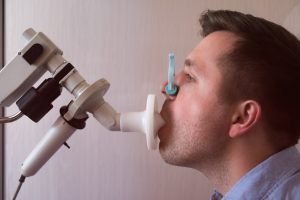Spirometry
Spirometry is a test your provider may order if you’ve been experiencing breathing-related symptoms including coughing, wheezing, and shortness of breath. Spirometry can help your provider detect health problems that affect breathing and lung function.
What Is Spirometry, and What Does It Measure?
Spirometry is a common type of breathing test that measures the amount of air you can breathe in and out of your lungs. This test also measures the ease and speed at which you can blow air out of your lungs.
What Can Spirometry Diagnose?

Spirometry can be used to diagnose a range of medical conditions that affect breathing. Asthma, chronic obstructive pulmonary disease (COPD), chronic bronchitis, emphysema, and pulmonary fibrosis are the most common medical conditions that are diagnosed with spirometry.
Why Get a Spirometry Test?
A spirometry test can help your provider diagnose a medical condition affecting your breathing, or determine whether your current treatment regimen is improving your condition.
What Are the Risks?
A spirometry test is generally safe. However, you may experience dizziness or shortness of breath for a moment after the test due to exertion from forcefully blowing air out of your lungs.
What Are the Benefits?
The top benefit to having a spirometry test is being able to determine whether you have a breathing-related medical condition so you can receive treatment. It can also determine whether your current treatment plan should be modified if you are already diagnosed with a breathing or lung condition.
How Long Does a Spirometry Test Take?
A spirometry test usually takes between 10 and 15 minutes. Your provider may give you tips on how to make your appointment shorter, such as wearing loose clothing that won’t interfere with your ability to breathe during the test.